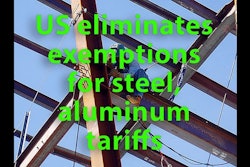
By Michael Kelsheimer and J.P. B. Vogel, Gray Reed & McGraw LLP
Whatever your political views, undocumented workers and the businesses that knowingly or unknowingly employ them have been under the microscope since President Trump took office in January 2017.
According to U.S. Immigration and Customs Enforcement (ICE), between Oct. 1, 2017, and May 4, 2018, there were:
- 2,282 employer audits opened, nearly a 60% jump from the 1,360 audits opened between October 2016 and September 2017,
- 594 employers arrested on criminal immigration charges, up from 139 during the previous fiscal year, and
- 610 civil immigration charges, compared to 172 in the preceding 12 months
The head of ICE’s Homeland Security Investigations unit, Derek Benner, recently said that another nationwide wave of audits planned this summer would push the total “well over” 5,000 by Sept 30, 2018. Keep in mind ICE audits peaked at 3,127 in 2013. He also said the agency has developed a plan to open as many as 15,000 audits a year, subject to funding and support for the plan from other areas of the administration.
According to a Pew Research Study, unauthorized immigrants represented 15% of workers in construction jobs in 2014. The national unemployment rate is at 3.9%, as of April 2018. If all the undocumented workers vanish, there will be hardly any place to find replacements.
Making things more risky for businesses, fines are up. Knowingly hiring undocumented workers carries fines between $539 and $4,313 per worker on a first offense. Failing to properly complete the Form I-9 carries a fine of $216 to $2,156 per document. Employers found to engage in a pattern or practice of hiring or recruiting undocumented workers may be penalized up to $3,000 per undocumented worker and receive six months in jail.
As contractors seek to offset the impact of the current labor shortage crisis, many will continue the long standing tradition of simply acquiring the most amount of labor possible in an attempt to timely complete work and not run afoul of any contractual default provisions. This being the case, some contractors will undoubtedly hire illegal, undocumented, or improperly documented immigrant workers. Therefore, owners, general contractors and first tier subcontractors must plan accordingly to protect their respective businesses from delay damages and back-charges as well as fines and jail time.
Develop an I-9 Compliance Program
For those responsible for providing labor, compliance is not just about making sure to follow the I-9 directions. It is about making sure your business is not letting applicants get by with shoddy documentation, no documentation, or requiring extra proof if they suspect someone is undocumented; while at the same time, not imposing requirements above and beyond what the I-9 requires, which can result in a lawsuit by the government or an applicant.
To protect against these issues, funnel handling I-9 issues through one person within your organization and make sure that person is trained to properly handle completing I-9s. The government finds, on average, five errors in each I-9 when it does an audit and each error can result in a fine. Create and maintain an internal I-9 compliance policy and mandate that it be followed by all hiring supervisors to ensure consistency in handling I-9s (this will even be helpful to protect the owners from liability if they consolidate handling I-9s with one person and that person does not follow the policy). Note, there was a new I-9 form issued in 2017. Be sure it is used with all new hires.
A good I-9 compliance policy will:
- Control who completes the I-9 paperwork
- Mandate the timing to complete the I-9
- Outline the correct procedure (and clarify incorrect procedures like asking for additional information, accepting suspect documents, or preferring certain documents over others)
- Arrange for the retention of I-9s
- Mandate the re-verification of temporary employment authorizations. Failure to re-verify documents that expire is a huge issue and a solid compliance policy will include a procedure to calendar and follow up on reverification.
- Plan for an I-9 self-audit once a year.
Let me also offer a word about using independent contractors. Many businesses try to avoid the I-9 and other issues by treating individuals who should be employees as contractors. They assume that doing so will protect them from violations. That is a fantasy. The government will also pursue business owners who intentionally circumvent the I-9 rules by trying to treat undocumented workers as contractors. It may be wise to require all contractors to ensure I-9 compliance for their employees and provide access to their I-9s on request for verification.
Conduct an I-9 Self-Audit
It is wise for business owners to conduct an I-9 self-audit on a regular basis to be sure their records are in top shape for an audit. This is especially true for business owners who delegate the responsibility to complete I-9s to another employee. A second set of eyes with the goal of making sure the forms are perfect will usually find some errors.
In addition to examining each form to be sure it is correctly filled out, employers should check whether I-9s on former employees are properly retained, how no-match communication from the government has been handled, and whether re-verification procedures are on schedule. If you find any errors, initiate correction procedures immediately.
Prepare for an Audit or Raid
Audits are conducted both by U.S. Immigration and Customs Enforcement (ICE) and, on a cursory level, by the Department of Labor. In either case, employers are entitled to three days’ notice before an I-9 audit. Raids are a different story. If ICE appears with a warrant, you will not have any notice and the agents will not care about interrupting your business operations.
If you receive notice of an audit, immediately contact your employment or immigration lawyer. They will protect you from inadvertently making mistakes with the auditor. Then work with your lawyer to conduct an I-9 audit immediately and correct any errors before the audit begins.
If ICE appears for a raid, immediately contact counsel and ask them to come to the site. ICE will not wait for your lawyer to arrive if they have a search warrant, so it will be necessary to examine the warrant yourself. Carefully review the warrant to ensure it is genuine. If you observe agents exceeding the warrant authority, ask to speak to the agent in charge and raise the issue. If you do not stand up for your rights, you may lose the opportunity.
If you are concerned a raid might happen, keep a current copy of all I-9 records and related documents on a flash drive to provide the agent in charge when they arrive. This may help minimize the time the agents spend at your facility.
Provide Guidance for Workers
If you are audited or the subject of a raid, government representatives may seek to speak with your employees about your procedures and their status. You can provide guidance to all your employees to help them avoid issues with government officials, but do not single any employee out for advice. Singling an employee out suggests you think there is a problem and can be used against you.
Years ago the Maryland Court Appointed Special Advocates created a guide for citizens that spread across the country. That advice still warrants consideration. Individual who have concerns when faced with an ICE raid should:
- Stay calm and not run away.
- Exercise their right to remain silent.
- Refuse to sign any document without showing it first to a lawyer.
- Carry all legal identification documents at all times, implying fake or illegal documentation should not be carried.
- Identify a well-qualified immigration attorney who can represent the employee if issues should arise and keep the lawyer’s contact information handy at all times.
Impact on the Construction Industry
If a construction project is interrupted by labor raids, investigations, and ultimately the removal of a vital portion of the project labor force, the project will be delayed and damages will flow. From the owner’s perspective, it is imperative to make sure all labor immigration issues are borne by its original contractor, thus ensuring they have no role in the process, except to the extent required by law.
Whether or not such issues are contractually delegated to a general contractor, it is the best business practice for general contractors to always be aware of applicable provisions in their prime contracts with owners relating to liability associated with delays caused to a project for any reason. In the context of this discussion, general contractors should be additionally vigilant to protect against liability associated with delays resulting from disruptions caused by a lack of labor due to immigration issues caused by subcontractors and their labor force. General contractors may attempt to draft accordingly within their prime contracts to remove liability in the event of immigration issues being the sole cause of a labor impact and related delay. As owners do unto general contractors, general contractors must do unto subcontractors by contractually requiring subcontractors to accept as much of the responsibility as possible for labor immigration issues.
In protecting themselves from a general contractor’s attempt to pass through liability associated with labor immigration concerns, subcontractors should make every effort to ensure immigration related delays are not a specifically enumerated breach or event of default or that they should not give rise to special liability to the general contractor. It would be most advantageous to subcontractors to have the ability to simply cure the impact of a diminished work force by quickly providing new labor, thus avoiding the possibility of termination or liquidated damages. Since subcontractors typically contract with or employ the direct labor on a construction project, to the fullest extent possible they should contractually place the burden of providing accurate information of laborer citizenship status upon the actual laborers or labor source if a broker is involved.
Michael Kelsheimer is a Partner at Gray Reed & McGraw LLP and focuses his practice on the employment law needs of Texas businesses and executive employees. Michael attended Texas Tech University and then Baylor Law School. Michael is also the author of TexasEmployerHandbook.com, a guide from Texas business owners. [email protected]
J.P. B. Vogel is a Partner at Gray Reed & McGraw LLP and serves as the chair of the firm’s Construction Industry Group. J.P. attended Texas A&M University and then St. Mary’s School of Law. J.P. is also a contributor to the Texas Construction Law Blog. [email protected]


















